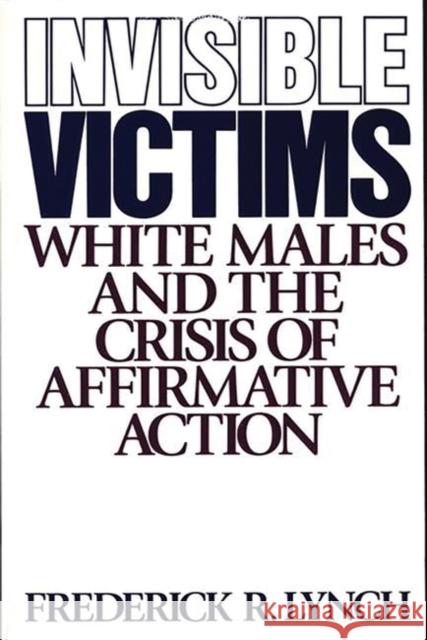Invisible Victims: White Males and the Crisis of Affirmative Action » książka
Invisible Victims: White Males and the Crisis of Affirmative Action
ISBN-13: 9780275941024 / Angielski / Miękka / 1991 / 256 str.
Invisible Victims: White Males and the Crisis of Affirmative Action
ISBN-13: 9780275941024 / Angielski / Miękka / 1991 / 256 str.
(netto: 139,59 VAT: 5%)
Najniższa cena z 30 dni: 145,44 zł
ok. 30 dni roboczych.
Darmowa dostawa!
Lynch condemns the sloppy, fearful thinking that has converted affirmative action into quotas and that has kept social researchers shying away from this explosive topic.
"Shulamit Reinharz Choice"
There is nothing quite like Frederick Lynch's book which describes how affirmative action works in real life, and points to some very disturbing effects. This is a subject that should be discussed not only in the Supreme Court and Lynch makes an important contribution to that discussion. "Nathan Glazer, Harvard University"
More and more questions have surfaced in the past decade concerning the wisdom and fairness of affirmative action programs. In this book, Lynch takes a hard look at affirmative action policy development and the social and ethical implications of a system that promotes gender and race as criteria for vocational advancement and educational opportunity. He focuses on the experiences of white males who have been victims of reverse discrimination under such programs and explores the lackluster response from government, the media, and employing institutions. Lynch examines the political taboo that for two decades effectively stifled discussion of the issues that affirmative action raises in both public discourse and scholarly analysis. He reviews the original ideals and purposes of affirmative action and contrasts them with the program as it has actually operated in everyday work settings. In case studies based on interviews and other data, Lynch assesses the reactions of white males to affirmative action social barriers, as well as their impact on co-workers, friends, and relatives. He describes the role of the mass media, the social sciences, and ideological elites in creating a conspiracy of silence concerning the hidden and unintended consequences of affirmative action policies. The only study that deals specifically with the impact of affirmative action on white males, this book is a must read for anyone who is truly interested in understanding the sociological, political, and psychological complexities of this issue.











